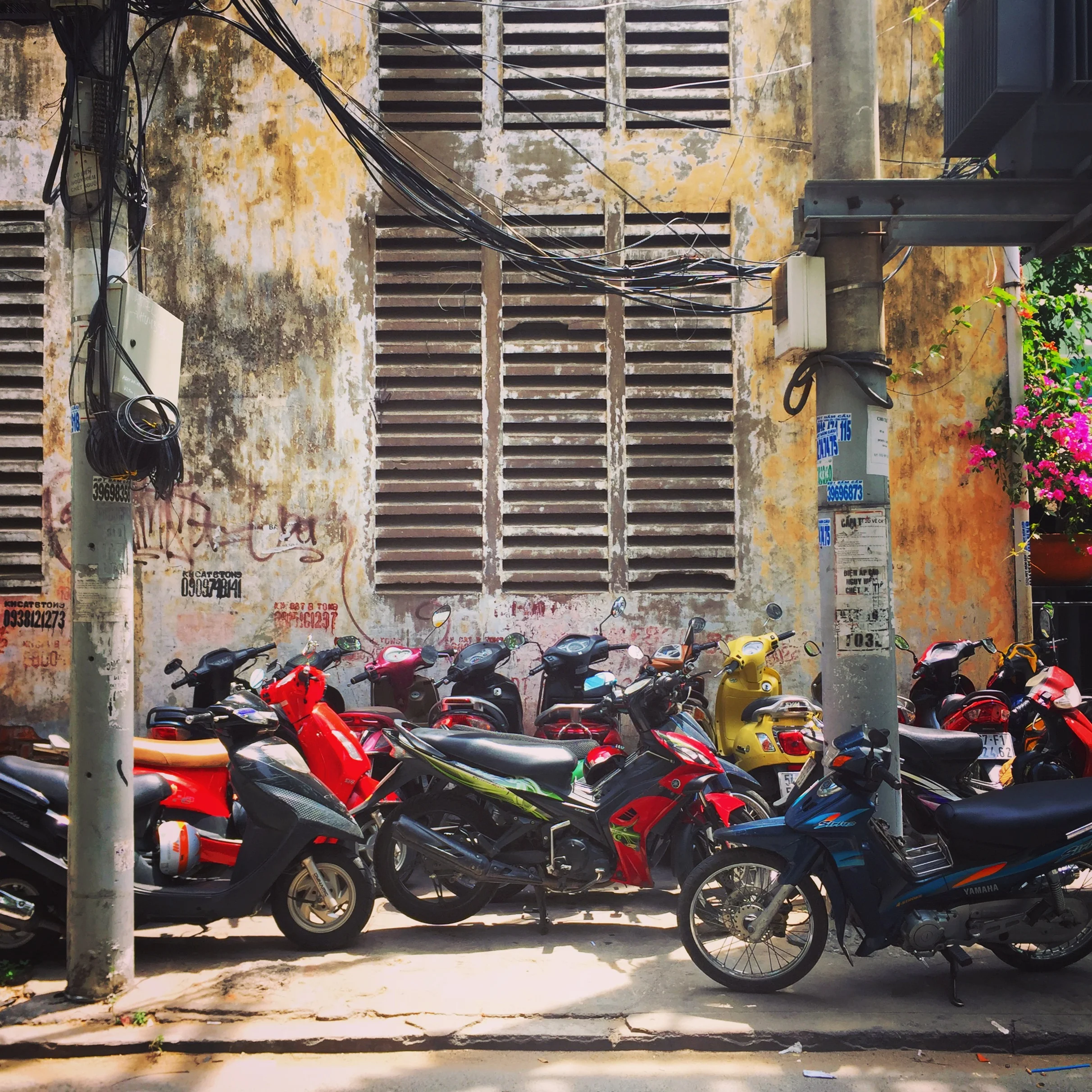I have a confession to make. I did something really lame. I read "Eat, Pray, Love."
There it was on the shelf of a used bookstore in Pai. Well, there wasn't just one. There were, like, twenty old copies on the shelf. I'd been mocking the book since I'd first seen it lying on a table at the Barnes & Noble in Union Square in Manhattan. I'd probably held it up for my friend Sarah, who I was probably meeting there before heading on for a glass of wine, and gone, "Ugh, have you seen this? This looks awful! I mean, how cliché, finding herself in India and Italy and Indonesia?! So obvious."
But there it was. I mean, all twenty of them. And the only book I'd been lugging around for the past few months was Hemingway's "A Farewell to Arms" which is Important and Real and True but sadly not proving to be a fast read (something about the long, bloody, sad descriptions of the Spanish Civil War I haven't found to be a real page turner). Besides, this little four-month sojourn of mine is kind of like my own little "Eat, Pray, Love," right? Why was I making fun of this woman so much? Maybe it wasn't so bad?
OK, so I knew it would be bad. I had seen the movie on a flight last year and it was awful. I just didn't know how bad, like eating cheese you know is past the expiration date or meeting up with a friend you've had a falling out with. I thought optimistically, Maybe it will be better than I think!
It was not.
I will start with the good and go from there. For starters, Elizabeth Gilbert is a really, really good writer. I can't deny that. She has a knack for conversational prose that makes every chapter feel like an email from an intimate friend. She vividly captures the sensuousness of each destination. She's brilliant at metaphor. And she takes some challenging concepts when describing mediation and makes them understandable for anyone, even people who shop at Banana Republic and like Oprah.
And, to be fair, I enjoyed the chapters on Italy. I mean, if you've just finally signed off on the divorce you initiated and aren't sure what's going on with the tumultuous relationship with the much younger man you dove into bed with while technically undivorced from your first husband, where better to give indulgent living a go? She describes delicious flavors of gelato, the good looking men, and her love for Italian, the most gorgeous and frivolous language in the world. It's frothy, it's fun, I found myself not even hating her too much for the reason she's there in the first place -- a book deal to "find herself" after struggling with all the depression that overtakes her after walking away from a marriage and love affair that didn't suit her.
There's a lot of flashbacks to the Great Depression that consumes her life; one takeaway I had is that what the book is really about is a very selfish, self-centered and self-absorbed woman learning to not be needy and dependent on other people. Her marriage seemed sadly like she'd entered into it very young, not really sure of herself or what she really wanted. And you know, while I've never been there myself, I felt bad for her. She seemed like she just didn't know herself very well, because what she really desperately needed was love -- or because she was just also desperately needy. Anyway, if you're going to be self-absorbed and self-centered, the best thing you can do it to organize your life so it minimizes the drain you inflict on other people. I mean, is there anything worse than a self-centered person who also needs constant love and approval and attention to feed their ego's unsatiable appetite? If the best that comes out of the author's journey is she becomes self-reliant while being selfish, then so be it. You go, girl. Rock on with your bad self.
That was my feeling by the end of the first part of the book. (My other feeling was hunger and wanting to plan a trip to Italy.) Then, India. Here is where I had to resist the urge to fling the book into the Mekong. Before I get into this, I just want to say, I have my own personal religious beliefs, and I'm sure that you, dear reader, whoever you are, do too. It's likely you see the world differently than I do, and I'm not here to argue with your faith, whatever it is, or, for the sake of my critique of the book, suppose that my particular outlook is 'right' and superior. And my willingness to accept that people have different faith systems extends all the way to Ms Gilbert. Where I struggled in this book is she begins, especially towards the second half of the second part, to take on a bit of a preachy, holier-than-thou tone about all the truths she discovers while mediating at an ashram in India.
In a nutshell, her theology seems to be as follows: there is a God, but it's not God God in the old-fashioned sense (or that has any ideas about right, wrong, etc.), it's my version of God. God/Divinity is within me. I chant it, so it must be true. And therefore, I can forgive myself for my bad behavior because God is within me is me. I am a version of God. If you want to 'heal' yourself, you, too, just have to sit and mediate devotionally (a practice she at one points likens as greater than any other challenge accomplished on earth) and then you can realize you too are divine, like God, and can just forgive youself, because you are God.
First of all, this is a beautiful thought. It really is. And I think it is true, to some extent. If you believe, for starters, that there is a God, you might extend that thought into saying "God created the world, and therefore everything in the world is a part of God." This I can agree with. (And just to keep going with the real confessions: I do believe in God, and I believe that we are witness to a constant unfolding of his creation. I also believe in dinosaurs and evolution and gravity and everything; I've never believed that science and the concept of God at work in the universe are two mutually exclusive concepts.) If we are part of God's creation, then yes, we are divine. We are special snowflakes! Whether we are the King of England or an orphaned child in the slums of Calcutta, our lives matter. We matter. If you've ever held an infant, you suddenly realize that life is this confounding miracle that seems greater than we deserve: life is divine.
I even think that some of our desires for perfection, for compassion, for justice, for immortality, for wanting to the infinite -- I think all these point to a side of ourselves that comes from and is part of the Divine. But -- and you knew there would be a but -- the problem is, while we all have some really nice aspects to our personalities and characters, none of us is truly divine. In fact, at our core, we're kind of rotten. We get impatient when the person ahead of us in line at the grocery store can't figure out how to use their debit card or furious when another person cuts us off on the road or jealous when an old co-worker's startup is suddenly worth a bajillion dollars or when our best frenemy's Instagram count tops 1000. We harbor decades-old grudges, fudge on our taxes, blame-shift, gossip, shirk assignments, pride ourselves when we are doing better than our neighbors, and fall apart when we realize we aren't. We're competitive, jealous, petty, mean. No, as a species, we are definitely not divine.
So: "the divinity within me forgives myself." OK, so maybe the non-rotten-core part of you, the God part, forgives you. Well, then, how do you know? Because you, like, felt some shimmering love feeling after chanting something in Sanskrit? How do you know you can trust that feeling? Because it felt good? I've had a lot of feelings in my life, some were right and some were wrong. I've fallen for the wrong guys, trusted bad people, been irrationally upset about things that later turned out to be trivial matters, misinterpreted people's intentions wrongly. I've also made a lot of smart decisions, sometimes based on practical things like street sense and sometimes on harder-to-place gut feelings. I don't know if this is "bowing to the divinity within me" so much as just having common sense or good intuition. Feelings are not always reliable though -- and sometimes feelings cloud our judgement, like, um, throwing ourselves into a relationship with a much-younger man who is perhaps somewhat unsuited for us while the first drafts of our divorce from our husband are being drawn up?
All right, fine, so the divine part of yourself forgives yourself, and it works for you. That's great, and maybe for something like your divorce, it's fine. (I would like to stop and say I think there is merit in releasing guilt about wrong things you've done/shortcomings, especially if you've asked for forgiveness from the person you offended. To be fair to the author, it sounds like she really did ask her husband for forgiveness and never really got it and was weighed down with a lot of guilt. I'm taking issue here with the problems I see in her theology.) But does this "self-forgiveness" work for other? For the boss who got you fired? The boyfriend who cheated on you? For criminals? They get to just decide they're off-the-hook because, you know, they forgave themselves? The problem for me is, it's great if we all decide to go around forgiving ourselves of all the bad things we've done -- it certainly feels better than feeling bad about them -- but then it's just one subjective point-of-view held against another. When you start to unpack this line of thinking, it's terribly unsatisfying. "Don't worry, world, Hitler's decided he's bowed to the divinity within himself and he's forgiven himself for all he's done."
Like I said, though, Gilbert is entitled to think what ever she wants to think. And write whatever she wants to write. What I object to more is the preachy tone she begins to adopt as she gets further and further into her chapter in India. At one point, she even states the criticism raised against her attitude towards "picking and choosing" her religious beliefs out of a cafeteria buffet and dismisses it, suggesting something along the lines of "whatever works for you is great because it works!" She observes that life inside the ashram is splendid, neat, clean and orderly, but just outside its walls, the poverty of India is very real, failing to make any connection that religions usually give rise to the circumstances that surround it. There's no attempt to reconcile the disconnect, no "Weird, I'm inside this lovely ashram that seemingly disregards the human struggle and despair happening just outside the doors, but, like, karma, man." For me, personally, this is simply lazy -- or maybe it just didn't fit in the pre-conceived outline of the book.
Hey, if mediation or chanting or whatever makes you more grounded or peaceful or more patient person in line at the grocery store, that's awesome. And if you came to me and said, "Jenne, I have discovered that when I mediate (or chant or make a to-do list or pray to a giant spaghetti monster in the sky) every day for an hour, I find I'm a lot nicer and way less depressed," I'd go, "that's great! Good for you!" I might even try it myself, see if it added a little extra joy to my life. My problem with "Eat, Pray, Love" is that the author presents her discoveries as somehow the way and the truth and the light. OK, so chanting and meditating in an ashram in India and discovering that you're divine and forgiving yourself is the answer? But by who's authority? Your own? The fallible, malleable, ever-shifting feelings had by a thirtysomething divorcée writer with as many flaws and good qualities as the rest of us, and a book deal? (Now, if the author started dropping knowledge about scoring cool book deals and pitching great magazine articles, I'd be all ears. But spiritual guidance? Uh, no thanks.)
Alas, the one thing I'd hoped for the book -- that the self-absorbed author would realize she could stand on her own two feet without projecting her dependency on everyone around her, or have some kind of turning point where she wakes up from her Narcissistic Slumber and realizes she's been selfish and needs to, like, give back to the world -- does not come to pass. At the end, a handsome older Brazilian man falls in love with her, and all he wants is to just love her and take care of her. (What luck!) This would be sweet if I had not found myself in the India section wishing that she would slip on the ashram floor, break her neck and spend the rest of the book in a rural Indian hospital with something real to contend with in her life. Instead, she gets flaky advice dispensed from an elderly Indonesian man who sounds a lot like Yoda and keeps reminding her to send her friends to him since he has no money in his bank account and befriends an Indonesian healer for whom she hits up all her friends back in NYC for money to buy a home. She almost gets conned out of the money but she tricks the healer at the end and everyone lives happily ever after, eating, praying and loving their way into oblivion.
I read this book three months in to my four month sojourn, what I joking referred to as my own "Eat, Pray, Love" before I left home, which I can definitively conclude it was not. What I found myself really wishing for in this book, all religious inanity aside, was some kind of recognition of the hardships of travel and being away for so long. Maybe an uncomfortable bed at the ashram, or the headache of constant strikes in Italy, or a missing suitcase debacle that challenges her newfound blissed-out state-of-mind. Instead, life is breezy and beautiful as she floats through all the new fabulous friendships thrown her way in Rome, socializes her way through her spiritual 'struggles' at the ashram, and idles her way through Indonesia, spending her days mediating, kicking it with the medicine man and joking around with the bawdy healer. I kept hoping there'd be a revelation that would inspire her to actually do something (besides just hitting up her friends for money to buy her healer-friend a house). There's little pain, minus the discomfort of sitting down meditating so much on the marble ashram floor. In just three months of travel, I've even found myself bored at times, tired of temple and waterfall hopping, wishing I'd structured in a few weeks of volunteering or learning to feel like I'd done something more meaningful with my time off, nevermind all the countless discomforts that are comprise my travel tale repetoire.
Because really, what offends me most about the book, way more than its flimsy, hole-ridden theology the author tries to push, is that it's just so unimaginative. So manufactured ... like it was, I dunno, conceived as a book deal. There's no unexpected twist, no moment of real growth; the biggest spiritual moment comes when she is told to pray a certain devotion she's been resisting. Um, OK? (By contrast, I read Cheryl Strayed's Wild earlier on this trip and really loved it more than I thought I would; there I found that the author's recount of her time trekking the Pacific Crest Trail was filled with her reconciling her past through losing herself in the pain, agony and endurance of conquering a challenging mountain trail.) I would have preferred an all-out rejection of everything, a turn to aetheism, joining the Moonies, some kind of realization that her preconceived notions about how she'd find spiritual enlightment weren't going to go as planned -- besides, how can you plan for spiritual enlightment, anyway?
After reading "Eat, Pray, Love," I do respect Elizabeth Gilbert as a writer. She has a beautiful way with words; I just wish she had something more substantial to say with them. And I don't regret reading the book -- now I'll know what I'm talking about when it come up in conversation and can have an informed opinion.
Although, I do regret not throwing it into the Mekong River.



